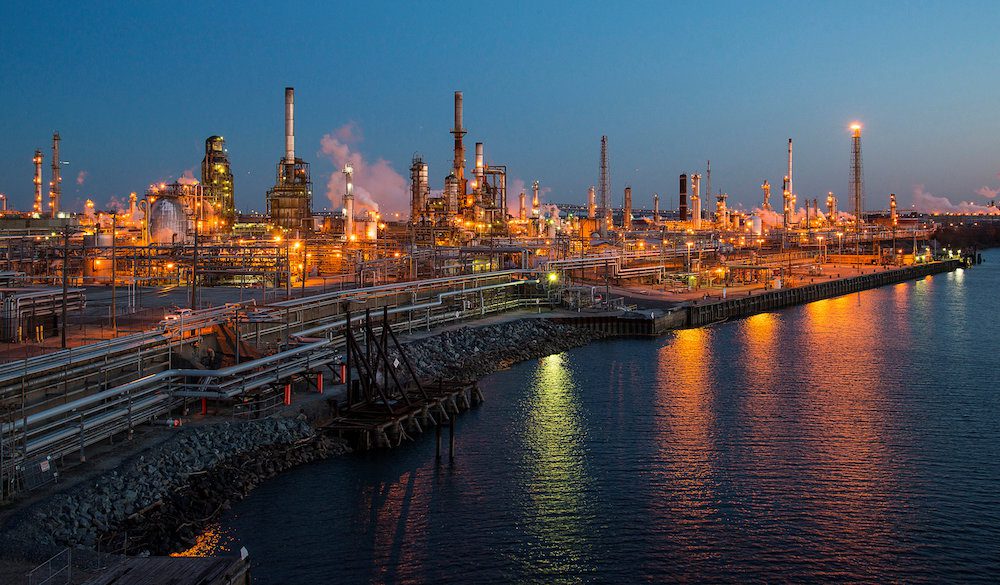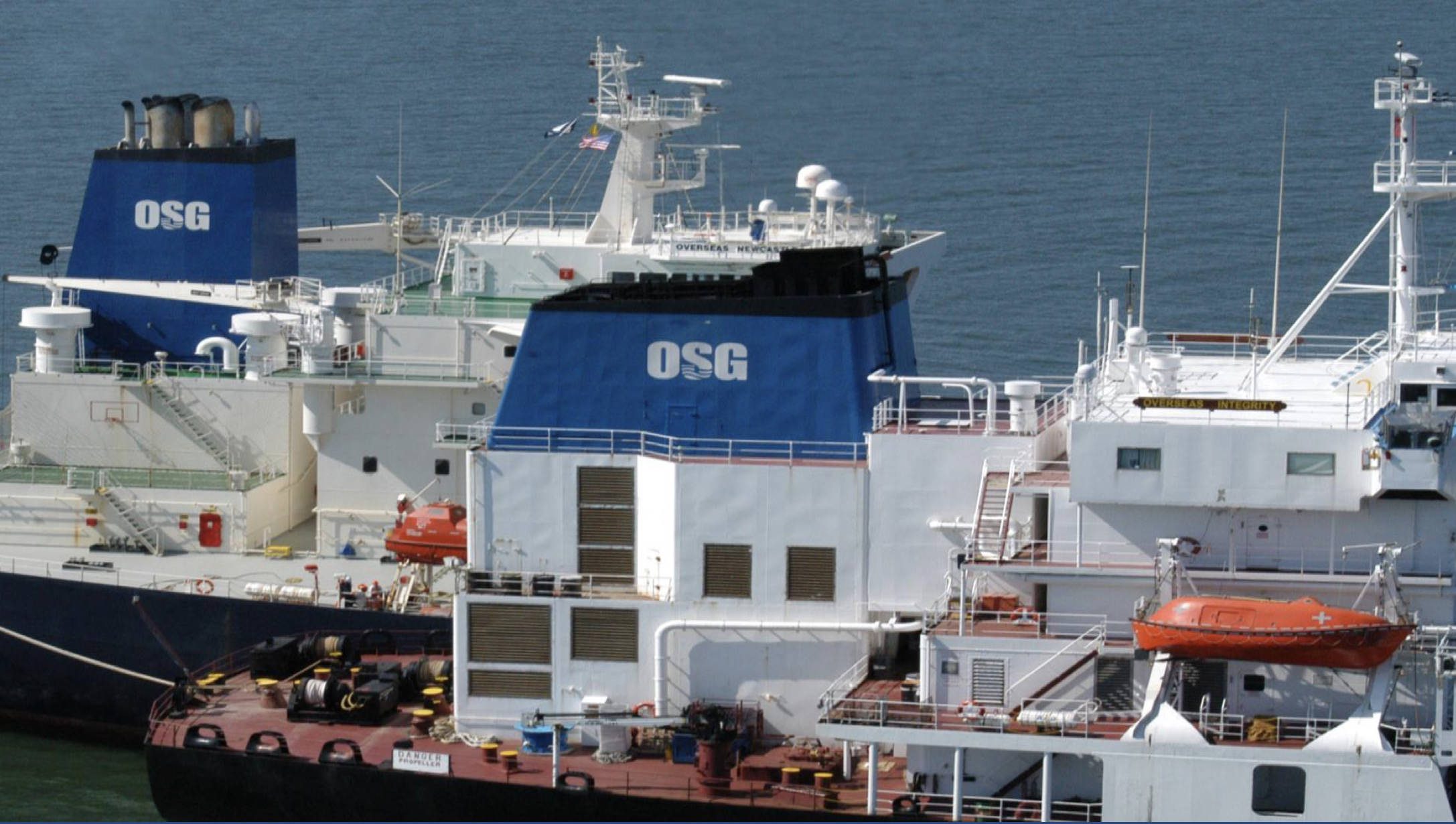FILE PHOTO: The Philadelphia Energy Solutions oil refinery owned by The Carlyle Group is seen at sunset in Philadelphia March 26, 2014. Picture taken March 26, 2014. REUTERS/David M. Parrott/File Photo
By Barbara Powell and Tiffany Kary (Bloomberg) — Philadelphia Energy Solutions LLC, owner of an oil refinery that supplies more than a quarter of the U.S. east coast’s crude refining capacity, filed for bankruptcy with a plan that could allow it to shed some environmental costs.
The restructuring would allow PES to emerge a new company with the same stakeholders, according to the firm’s chief executive. Court filings show it intends to do so through a sale that will erase $300 million to $350 million of compliance costs. Those expenses helped spur the Chapter 11 filing by PES, which runs the largest oil refinery serving the New York Harbor gasoline and diesel market. It’s a joint venture between Carlyle Group LP and Energy Transfer Partners LP subsidiary Sunoco Inc.
The compliance costs include “renewable identification numbers” or RINs, which the company was forced to buy under a federal program that has cost $832 million since 2012, the court filing shows. The purchases create an “unpredictable, escalating and unintended compliance burden” that amount to twice the cost of payroll and almost 1-1/2 times capital expenditures, the company said.
“Absent RINs, we’re competitive with anyone in the world,” Chief Executive Officer Greg Gatta said in telephone interview Monday.
Biofuel Costs
Independent U.S. refiners that lack the infrastructure to blend biofuel into gasoline and diesel have been hit hard by surging costs for the credits they must buy to meet Environmental Protection Agency quotas for ethanol and biodiesel. The Trump Administration in late November rejected a bid by fuel-makers including Valero Energy Corp. to relieve refiners of the obligation. Billionaire Carl Icahn, the majority owner of CVR Energy Inc., has complained that the program structure is “rigged.”
“RINs going forward continue to be an issue for independent merchant refiners,” Gatta said. “We continue to work with the government to find a solution that works for everyone.”
Under terms of the filing in Delaware late Sunday, PES seeks to sell off assets while leaving behind $300 million to $350 million worth of the compliance liabilities, effectively erasing them. It might also opt not to sell its assets and reorganize on a stand-alone basis. But in that case, the company will have $225 million less in cash and $275 million more in debt, according to court records.
The PES plan already has support from key lenders, according to court documents. The Chapter 11 filing allows the company to keep operating while it works out a recovery. Assets sale could be subject to competing bids as well court approval, which PES is seeking by Feb. 23.
Lender Support
Lenders to two term loans were unanimously in favor of the preliminary plan, according to court filings. On term loan A, $97.5 million in debt including large stakeholders such as Goldman Sachs Lending Partners and PNC Bank National Association voted for the plan. For term loan B, $486 million voted for it, including several funds of Credit Suisse Group AG and Halcyon Capital Management.
More than $260 million in new funding will be infused, giving current lenders debt or equity in a new company. Term loan B lenders are financing a $120 million bankruptcy operating loan that will convert to an exit loan. A non-bankrupt parent, Philadelphia Energy Solutions LLC, will invest $65 million in exchange for 25 percent of equity in a new company and Sunoco will also put $75 million in new money into the company, court papers show.
To read more about how the farm lobby beat the oil industry on biofuels, click here.
Formed in 2012 as a result of a partnership between Carlyle and Sunoco, PES drew government aid and was hailed by state, city and union leaders as it worked to save the plant, which faced shutdown due to dwindling margins. The company was able to ride the back of the U.S. shale boom, building a terminal to take in trainloads of cheap oil from North Dakota that couldn’t be sold elsewhere.
1,100 Employees
The end of the U.S. crude export ban in late 2015 and the start of the Dakota Access pipeline last year forced East Coast refiners to turn back to more expensive imports.
The refinery, a 1,300-acre tract near downtown Philadelphia, will keep operating and there will be no impact on jobs, salaries and benefits of the company’s 1,100 employees. It is operated as two plants — Girard Point and Point Breeze — with a combined processing capacity of 335,000 barrels a day of crude oil. It remains the largest oil refining complex on the U.S. Eastern seaboard.
The plan brought in PJT Partners Inc. as the company’s investment adviser. Alvarez & Marsal North America LLC is a restructuring adviser and Kirkland & Ellis LLP is legal adviser on the plan, according to court papers.
The case is PES Holdings LLC, 18-10122, BBLS DD X1Q6NUPPP282 U.S. Bankruptcy Court, District of Delaware (Delaware.)
© 2018 Bloomberg L.P
Unlock Exclusive Insights Today!
Join the gCaptain Club for curated content, insider opinions, and vibrant community discussions.

 Join The Club
Join The Club







![A screengrab of a map showing an earthquake Mindanao, Philippines on Dec 2, 2023. (Image: US Geological Survey [USGS])](https://gcaptain.com/wp-content/uploads/2023/12/Screenshot-2023-12-02-at-10.45.17-AM-copy.png.webp)





